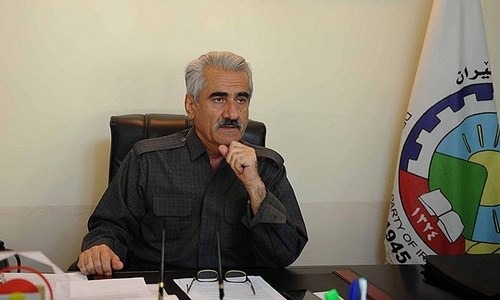
Mustafa Hijri (Photo credit: PDKI website)
2018-06-12
926 View
+
-
SULAIMANI — The Secretary-General of the Democratic Party of Iranian Kurdistan, Mustafa Hijri, gave a speech to the Council on Foreign Relations in Washington, DC on Monday (June 11), in which he condemned the denial of Kurdish rights and the deliberate policies of Tehran that kept the Kurdistan Region of Iran in a state of economic underdevelopment.
He framed his speech in terms of tension between the “long tradition of state centralization” where political space is reserved for “the Shia faith, while other communities and identities are excluded and suppressed.”
“Since the revolution of 1979, the so-called intellectuals and officials of the Islamic Republic have used the term ‘tribal regions’ for those regions of Iran populated by the non-Persian nations. Following the revolution, the Islamic Republic once again divided Iran between a ‘center’ and ‘peripheral region,’” he said.
While he decried the denial of the national rights of other groups such as Arabs, Azerbaijanis, Balocuh, and Turkmen, the bulk of his speech focused on the economic underdevelopment of the Kurdistan Region.
He argued that the policies of the government in Tehran have thrown up significant obstacles for economic development, such as the large number of checkpoints and military garrisons that deters investment, the deliberate administrative fragmentation of the region, the promotion of businessmen from elsewhere to the detriment of local entrepreneurs, and the appropriation of natural resources and minerals for use by the central government.
This, Hijri argued, has created high levels of social discontent and spurred the migration of more than 50,000 Kurds annually just from the province of Kermashan to the cities in search of work.
“State policy of economic development and long-term economic planning in Iran thus reveal that such policies are based on a center-periphery relationship, which in turn has resulted in systematic discrimination of the non-Persian regions.”
“The marginalization of the Kurdish provinces are consequently a result of the ideology of the Islamic Republic and existing political system in Iran,” he added.
He then went on to cite a number of statistics regarding the poor economic climate in the region:
– Among the 10 cities in Iran with the highest rate of unemployment, 6 of them are in Iranian Kurdistan;
– The Kurdish province of Kermashan has the highest rate of unemployment in Iran; one-fourth of its inhabitants are unemployed;
– Unemployment in the cities of the province of Kurdistan is above 60%;
– Kurdistan has the highest number of unemployed among university graduates;
– Poverty and unemployment have resulted in the rise of divorce rates and the disintegration of families;
– The social consequences of poverty are perhaps most severe in the Kurdish province of Ilam, which has the highest rate of suicide in Iran, as well as the highest rate of self-immolation in the world;
– On average, every month 6 Kurdish porters are killed, while 16 others are wounded by Iran’s Islamic Revolutionary Guards.
Hijri then broadened the scope of his argument to criticize the foreign policy of the Iranian government, which he said reflected the same ideology of domination and oppression that it practiced at home regarding the “peripheral regions.”
He then called on the international community “to support the waves of popular discontent and civil resistance to the Islamic Republic across Iran that have gained momentum since last year.”
He concluded by noting that, as a party, it was committed to coordinating “its struggle with other forces all over Iran to bring about a democratic government.”
The PDKI was founded by Qazi Muhammad in 1945 and advocated for self-determination of Kurdish people. It has staged several unsuccessful armed actions, most recently in 2016.
(NRT)